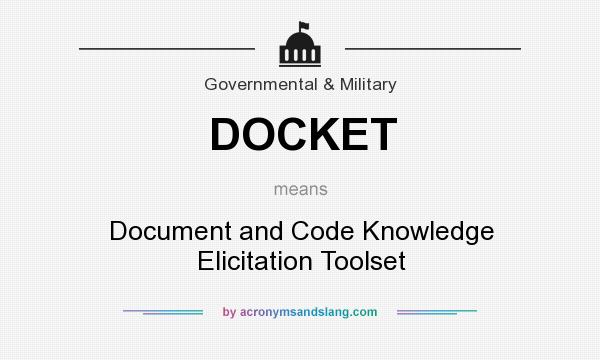What does DOCKET mean?
DOCKET means Document and Code Knowledge Elicitation Toolset
This acronym/slang usually belongs to Government & Military category.
What is the abbreviation for Document and Code Knowledge Elicitation Toolset?
Document and Code Knowledge Elicitation Toolset can be abbreviated as DOCKET

|
|
Most popular questions people look for before coming to this page
| Q: A: |
What does DOCKET stand for? DOCKET stands for "Document and Code Knowledge Elicitation Toolset". |
| Q: A: |
How to abbreviate "Document and Code Knowledge Elicitation Toolset"? "Document and Code Knowledge Elicitation Toolset" can be abbreviated as DOCKET. |
| Q: A: |
What is the meaning of DOCKET abbreviation? The meaning of DOCKET abbreviation is "Document and Code Knowledge Elicitation Toolset". |
| Q: A: |
What is DOCKET abbreviation? One of the definitions of DOCKET is "Document and Code Knowledge Elicitation Toolset". |
| Q: A: |
What does DOCKET mean? DOCKET as abbreviation means "Document and Code Knowledge Elicitation Toolset". |
| Q: A: |
What is shorthand of Document and Code Knowledge Elicitation Toolset? The most common shorthand of "Document and Code Knowledge Elicitation Toolset" is DOCKET. |
Abbreviations or Slang with similar meaning
- DOMEX - Document and Media Exploitation
- DAPSS - Document and Personnel Security System
- DAC - Document Availability Code
- DIC - Document Identifier Code
- DRM - Document and Record Management
- DMC - Document and Material Control
- DPRL - Document and Pattern Recognition Lab
- DWMS - Document and Workflow Management System
- DMCS - Document and Material Control System
- KE - Knowledge Elicitation
- AKO - And A Knowledge
- DDCS - Document and Data Control System
- DDMS - Document and Data Management Services
- DIC - Document Identification Code
- DLI - Document and Library Integration
- DOKS - Document and Knowledge Sharing
- DPSS - Document and Personnel Security System
- DPS - Document and Publication Services
- DSC - Document Status Code
- KAS - Knowledge, Attitude, Skills. The constituents required for people to succeed at what they do, individually and collectively. Knowledge and Skills can largely be trained; Attitude can't - it's a factor of personality, emotion, personal circumstances, and t